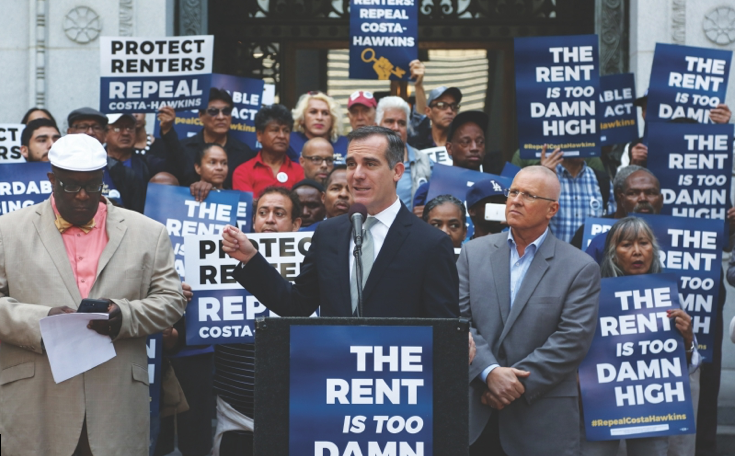CommentsPLANNING POLITICS--Do you rent an apartment in California? Do you want rent Control? Have you heard of Proposition 10? Do you know about the Costa-Hawkins Housing Act?
If you answered no to the first two questions you’re not alone.
When asking people around Los Angeles, many have heard of the two, but don’t have any idea of what they are or how important Prop 10 will be in November.
California has one of the highest costs of living in the United States. Los Angeles sits at number 9 on the most expensive US cities to live in.
According to censusreporter.org, 64% of the housing in Los Angeles is occupied by renters. The rents in Los Angelss are astronomical compared to the median family income.
According to RentCafe.com the average rent for any apartment in Los Angeles is $2,265, a 3% increase over the previous year.
When we breakdown the numbers based on unit type, Studio apartments in Los Angeles rent for $1,622 a month, while 1-bedroom apartments go for an average $2,068 a month; the average rent for a 2-bedroom apartment is $2,782.
The Median Family Income in Los Angeles is at $69,300 (HudUser.gov). Rent is impossible to maintain for many families. The general recommendation is to spend about 30% of your gross monthly income (before taxes) on rent. Therefore, if you make $4,000 per month, then your rent should be $4,000 x 0.3, or about $1,200. The average family in Los Angeles spends about 60% of their monthly income on rent and this is not okay.
How are Los Angeles families going to survive if this trend continues?
As you may have noticed, issues between landlords and tenants over the last few years have spiraled, with many landlords using unfair rent increases to force tenants out. Between 2016 and 2017, LA rent prices increased 4.5% … higher than California’s 4.3% and the national average of 2.8% and with the growing numbers of new construction rent will continue to rise.
These rising rent prices have put many people in a very difficult place, leaving many on the streets or forced to live in their vehicles.
Much of this is due to the Costa-Hawkins Housing Act set in place in 1995, which limits the kind of rent control policies that cities are able to impose. If you’re not familiar with rent control, in its simplest explanation, rent control sets regulations that govern the amount/percentage landlords can charge tenants for rental property such aa apartments, houses, etc.
Now while Costa-Hawkins is a bit complicated it can basically be summed up in three main provisions.
- It protects a landlord’s right to raise the rent to market rate on a unit when a tenant moves out.
- It prevents cities from establishing rent control or capping rent on units established on units built after 1995.
- It exempts single family homes and condos from rent control restrictions.
These are the base principles of the Costa-Hawkins Housing Act. Now comes Proposition 10, which hopes to ease this burden on California residents.
While not a bill to establish an automatic rent control across California, Proposition 10 would overturn Costa-Hawkins. Thus allowing local governments to adopt rental control ordinances as they see fit.
Proposition 10 has been met with great support from people like Larry Gross Executive Director of the Coalition of Economic Survival and he said, “We must vote yes on Prop 10, repeal Costa Hawkins and get rent control reestablished in Los Angeles”.
LA Mayor Eric Garcetti is also in support of the Proposition 10. He told NBC Los Angeles “I've always believed that those who live closest to a given block or a street know what's best. Local government should have control over their own city."
Lindsey P. Horvath, a member of the West Hollywood City Council and fellow supported believes Proposition 10 with help relieve the housing crisis stating “California is experiencing a housing and homeless crisis like we’ve never seen before and policies like Costa-Hawkins have had a devastating effect on housing affordability … Costa-Hawkins has undermined our ability to protect our residents from being displaced, especially the most vulnerable, due to skyrocketing rent increases.”
The proposition has also been met with its fair share of opposition. Many of those opposed believe that the proposition will actually make the housing crisis worse, ultimately hurting those it’s trying to help. Tom Bannon, CEO of the California Apartment Association believes that it would discourage new building stating “It’s a disincentive for the construction of new, multifamily housing.” to The Sacramento Bee earlier this year. In short, the biggest argument most opponents have is that the bill would scare off possible developers looking to build new housing. The co-authors of the bill, Rep. Richard Bloom and Assemblymember David Chiu argue this sentiment though. They believe that newer construction alone would not be enough to make housing affordable with tenants being priced out of more expensive cities like Los Angeles.
For more in depth information on Proposition 10 and the arguments in support and opposition you can visit theProp 10page at ballotpedia.org. It’s important to be as knowledgeable as possible before the vote in November. Remember, Proposition 10 could have a profound impact on your housing future.
(Adrienne Nicole Edwards is a community advocate and a member of the NC Budget Advocates Committee and a CityWatch contributor. Charlie Williamson, a community activist, contributed to this story.)
-cw
















